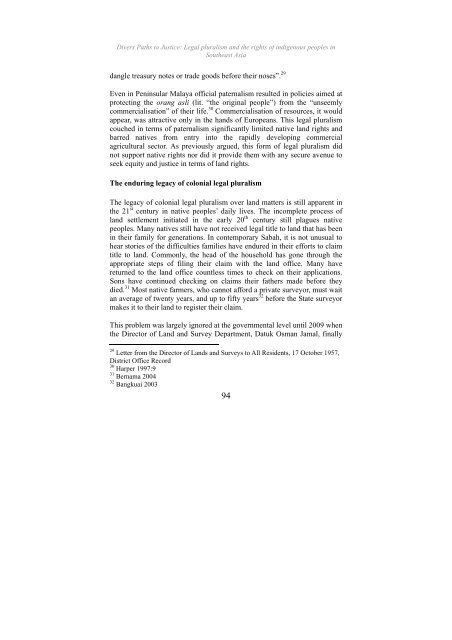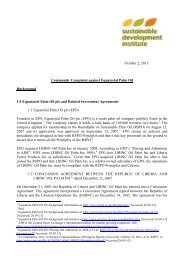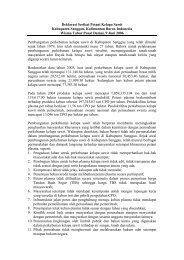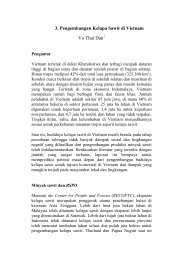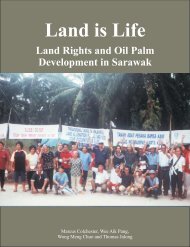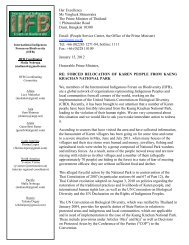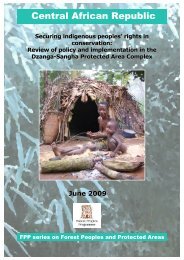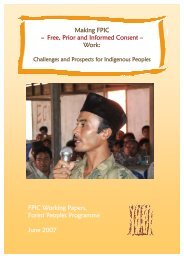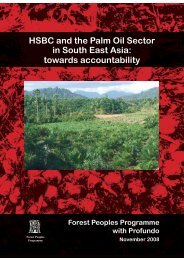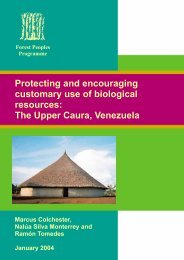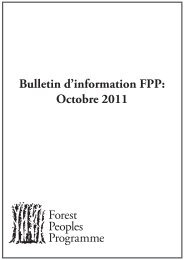Divers Paths to Justice - English - Forest Peoples Programme
Divers Paths to Justice - English - Forest Peoples Programme
Divers Paths to Justice - English - Forest Peoples Programme
Create successful ePaper yourself
Turn your PDF publications into a flip-book with our unique Google optimized e-Paper software.
<strong>Divers</strong> <strong>Paths</strong> <strong>to</strong> <strong>Justice</strong>: Legal pluralism and the rights of indigenous peoples inSoutheast Asiadangle treasury notes or trade goods before their noses”. 29Even in Peninsular Malaya official paternalism resulted in policies aimed atprotecting the orang asli (lit. “the original people”) from the “unseemlycommercialisation” of their life. 30 Commercialisation of resources, it wouldappear, was attractive only in the hands of Europeans. This legal pluralismcouched in terms of paternalism significantly limited native land rights andbarred natives from entry in<strong>to</strong> the rapidly developing commercialagricultural sec<strong>to</strong>r. As previously argued, this form of legal pluralism didnot support native rights nor did it provide them with any secure avenue <strong>to</strong>seek equity and justice in terms of land rights.The enduring legacy of colonial legal pluralismThe legacy of colonial legal pluralism over land matters is still apparent inthe 21 st century in native peoples’ daily lives. The incomplete process ofland settlement initiated in the early 20 th century still plagues nativepeoples. Many natives still have not received legal title <strong>to</strong> land that has beenin their family for generations. In contemporary Sabah, it is not unusual <strong>to</strong>hear s<strong>to</strong>ries of the difficulties families have endured in their efforts <strong>to</strong> claimtitle <strong>to</strong> land. Commonly, the head of the household has gone through theappropriate steps of filing their claim with the land office. Many havereturned <strong>to</strong> the land office countless times <strong>to</strong> check on their applications.Sons have continued checking on claims their fathers made before theydied. 31 Most native farmers, who cannot afford a private surveyor, must waitan average of twenty years, and up <strong>to</strong> fifty years 32 before the State surveyormakes it <strong>to</strong> their land <strong>to</strong> register their claim.This problem was largely ignored at the governmental level until 2009 whenthe Direc<strong>to</strong>r of Land and Survey Department, Datuk Osman Jamal, finally29 Letter from the Direc<strong>to</strong>r of Lands and Surveys <strong>to</strong> All Residents, 17 Oc<strong>to</strong>ber 1957,District Office Record30 Harper 1997:931 Bernama 200432 Bangkuai 200394


